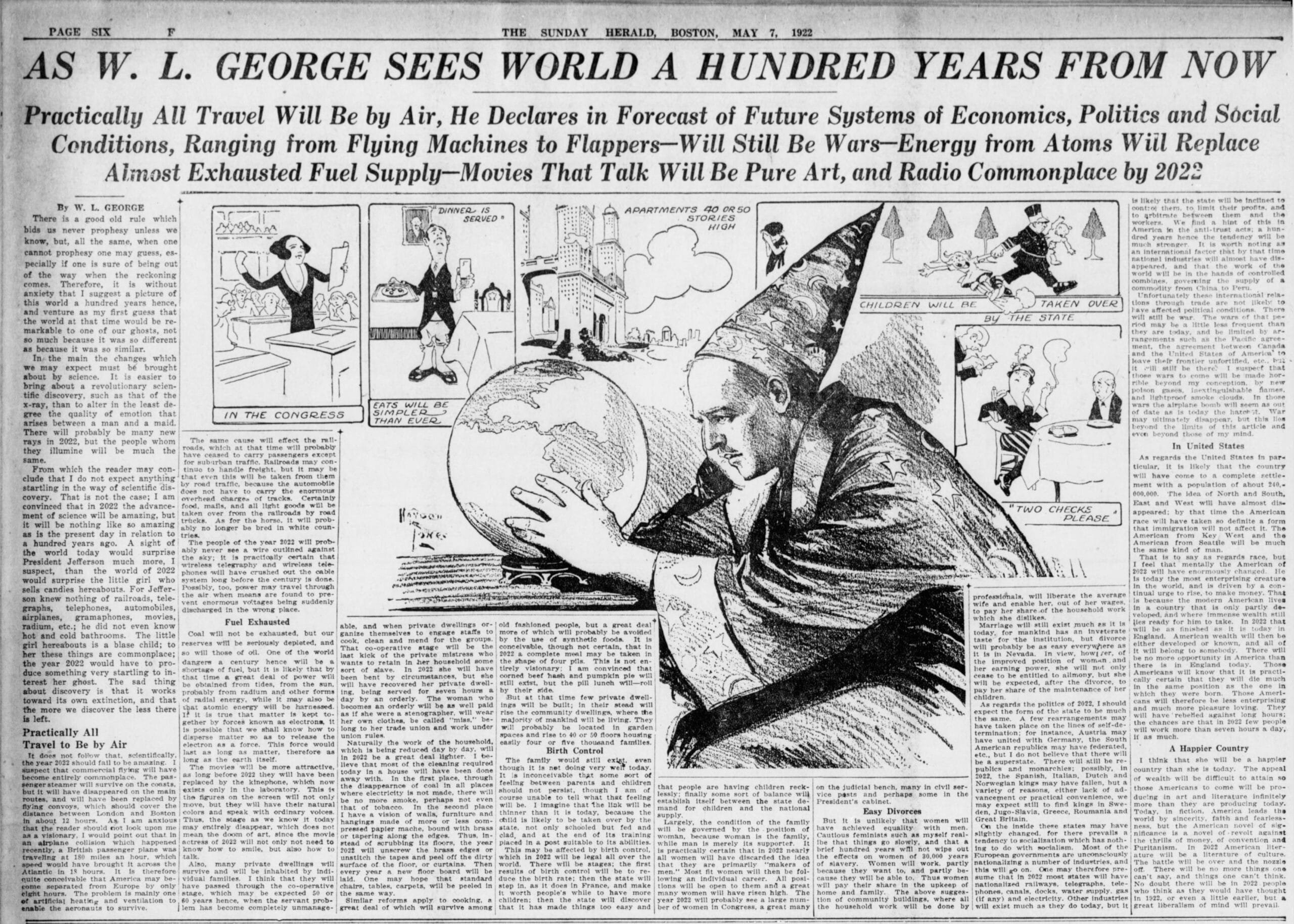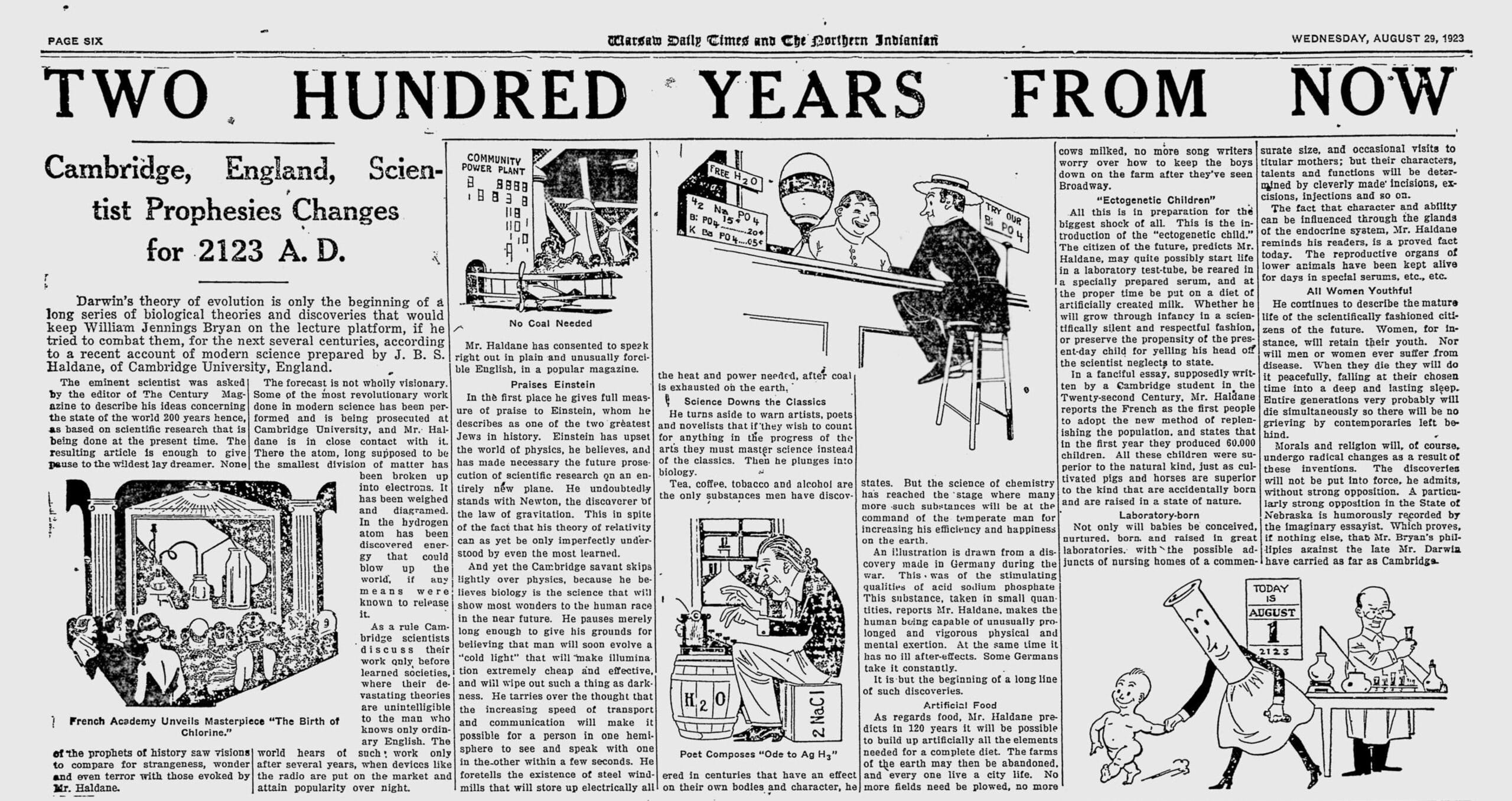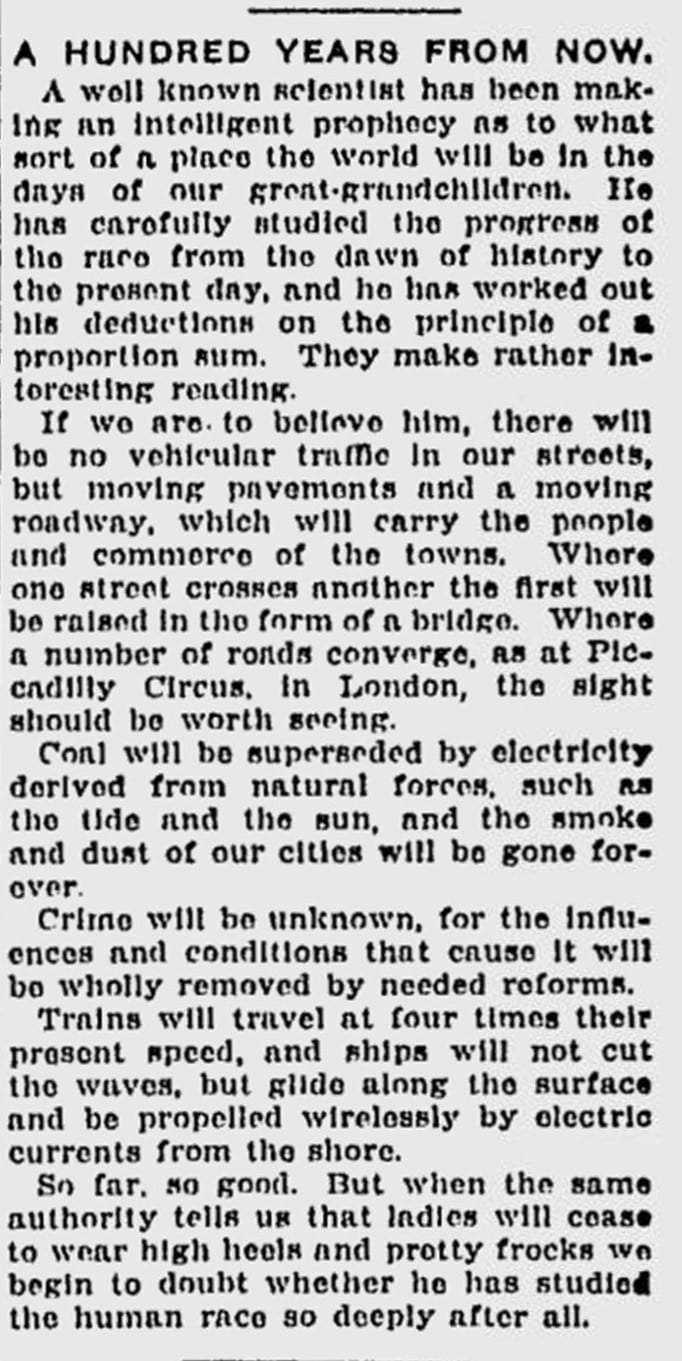How People From 100 Years Ago Imagined 2024
- By Roi Mandel & Daniella Levy ·


They say that today’s news is tomorrow’s fish and chip paper. Collective memory is short and the news changes frequently; who knows what will happen tomorrow?
Still, people have always wondered what the future will look like. Just as they do today, 100 years ago, newspaper editors offered a platform to various sociologists, scientists, or intellectuals forecasting what the world would look like in a century… that is, in our times.
The Research team at MyHeritage dove into the historical newspaper archives on OldNews.com and went back in time to see what the “experts” of yesterday predicted that our world would look like. What did they get right, and what did they get completely wrong?
Science & technology
In May 1922, The New York Herald dedicated a full front page of their magazine section to the English writer, Walter Lionel George, who was known for his popular fiction. In his article, “What the World Will Be Like in a Hundred Years,” George was skeptical about the possibility that science would lead to revolutionary changes in the early 21st century, as the Industrial Revolution had brought about change in the early 20th century.
“I am convinced that in 2022 the advancement of science will be amazing, but it will be nothing so amazing as is the present day in relation to a hundred years ago,” wrote George, who clearly didn’t see the digital revolution coming — much less the AI revolution. “The sad thing about discovery is that it works toward its own extinction, and that the more we discover, the less there is left.”
Oh, how very wrong he was.
However, he got one thing about technology sort of right: “The people of the year 2022 will probably never see a wire outlined against the sky — it is practically certain that wireless telegraphy and wireless telephones will have crushed out the cable system long before the century is done.” Wireless and satellite transmission are certainly widespread, but telephone wires are still responsible for much of the transmission of information today.
15 years before the introduction of the domestic washing machine and a century before the invention of the Roomba, George predicted that housework would become easier. ”The work of the household which is being reduced day by day will in 2022 be a great deal lighter. I believe that most of the cleaning required today in a house will have been done away with.”
A particularly interesting article published in the Warsaw Daily Times in August 1923 includes a prediction by scientists from the University of Cambridge looking ahead not 100 years, but 200 years. The article discusses the importance of scientists, talks about Albert Einstein as someone who influenced humanity like Newton, and claims that intellectuals, writers and artists will have to master the sciences instead of classical studies in order to adapt to the changing world. Humans will need to find substances that will help them keep up. “Tea, coffee, tobacco and alcohol are the only substances men have discovered that have an effect on their own bodies and character, but the science of chemistry has reached the stage where many more such substances will be at the command of the temperate man for increasing his efficiency and happiness on earth.”
The most astounding prediction in the article is how children will be raised in the future. According to the Cambridge scientists of 1923, children will be grown in the laboratory and not in their mother’s womb. “The citizen of the future may quite possibly start life in a laboratory test-tube, be reared in a specially prepared serum and at the proper time be put on a diet of artificially created milk.” “Not only will the body grow in the laboratory, but also the character, skills and functions will be determined by cleverly made incisions, excisions, injections and so on.”
Regarding life and death, many women will be happy to learn that according to the forecast, women will keep their youthfulness until the day they die, and both men and women will die in complete peace, without disease.
The only thing that threatens technological developments, the scientists recognized even then, is the ”expected great opposition of morals and religion.”
Travel
Going back to George in the New York Herald in 1922, one thing he got right was that commercial flights would become commonplace: “Commercial flying will have become entirely commonplace,” he wrote. “The passenger steamer will survive on the coasts, but it will have disappeared on the main routes, and will have been replaced by flying convoys.”
The trip from Europe to the U.S., the writer correctly estimated, would be shortened to 8 hours. He also correctly predicted that horses will no longer be used as a means of transportation, and goods will be transported by trains.
An even older article, published in 1908 in The Sunday Vindicator and based on the research of a scientist trying to predict what will be here in 100 years, was too fanciful about what the future would look like. “There will be no vehicular traffic in our streets but moving pavements and a moving roadway, which will carry the people and commerce of the towns, where one street crosses another, the first will be raised into the form of a bridge.”
What will cinema look like in the 21st century? “The movies will be more attractive,” writes George in The New York Herald. “The figures on the screen will not only move, but they will have their natural colors and speak with ordinary voices.” He probably couldn’t have dreamed up CGI!
The 1908 Sunday Vindicator article ends with an amusing disclaimer, which shows the magnitude of the basic error in predicting the future: “So far so good, but then the same authority tells us that ladies will cease to wear high heels and pretty frocks. We begin to doubt whether he has studied the human race so deeply after all.”
Food
George’s vision of food in the 21st century was too ambitious. Humans, George assumed, would continue to eat corned beef, hash, and pumpkin, but most of the meal would be synthetic: we would swallow capsules that would contain all the food ingredients.
An August 1927 article in The Grape Belt reports on the results of a study by American scientists famous in Geneva, according to which the world’s population is going to increase significantly — a larger amount than the world can contain. How will they feed the world’s citizens? Little did the scientists know that fast food chains would take over the Western world decades later, but the general idea was the same. “Cheap, synthetic food is a dream or a nightmare, depending on how you feel about the population.”
Pollution & energy
“Through the disappearance of coal in all places where electricity is not made there will be no more smoke, perhaps not even that of tobacco,” predicted George in 1922.
The 1908 Sunday Vindicator forecast regarding energy sources was correct about the direction we’d be taking with energy production: “Coal will be superseded by electricity driven from natural forces such as the tide and the sun.” However, they were completely wrong about the air pollution issue: “The smoke and the dust of our cities will be gone forever.”
Society
The family model, George estimated, will be changed in 2022. He believed that there would be a limit on the number of children a family can have. Regarding the status of women, he believed that “their status as heads of the household will change significantly, when women develop a career and enter the labor market.” In this, at least, 100 years later, he hit the nail on the head. What’s particularly fascinating is his fairly accurate prediction regarding the status of marriage: “Marriage will still exist much as it is today, for mankind has an inveterate taste for this institution, but divorce will probably be as easy everywhere.”
Politics
International trade agreements, George predicted, would bring about political changes, but these would not prevent future wars. Just a few years post-World War I, George was chillingly right about one thing: “I suspect that those wars to come will be made horrible beyond my conception by new poison gasses, inextinguishable flames and light proof smoke clouds.”
The American scientists in the 1927 article from the Grape Belt warned that the world must deal with the population problem, but there are several significant challenges that prevent this: the desire of nations to hear about their military power, the desire of despotic rulers to have the largest possible number of subjects, religious zeal of various nations to have the greatest possible number of followers and also cultural desire of various nations to rule the world with their particular traits.
Where will we be a century from now?
As we see above, some aspects of the future may be easier to predict than others. Some areas of technology, science, and medicine have developed at a dizzying pace in recent decades, while others have lagged behind. We don’t know what the future will bring, but we can make educated guesses based on current trends — and we can look back into the past and appreciate how far we’ve come. Perhaps, 100 years from now, our descendants will compare our predictions from today to their own reality. We can only hope that the world continues to become cleaner, safer, and happier from century to century.
What might your ancestors have thought about your life today? See the world through their eyes by exploring the newspapers they read — and find fascinating stories about them — on OldNews.com.














Randy Seaver
April 8, 2024
Now do how 2024 people think about 2124. Will family trees ever be “complete?” Will “climate change” put us back in horses and buggies? Or permit us to control weather?
Will we be able to teleport from one place to another? What about time travel? Will humans have visited a Jupiter moon, or Pluto, yet? Will space aliens finally contact Earthlings? Will there be one-world government and control? What animals will be extinct? Will all babies be born via in-vitro fertilization and an artificial womb? Will DNA advances permit gene editing so parents can choose genetic variations? Will lifespans lengthen? Will there still be isolated genetic communities on islands or in forests? Will different ethnicities and/or religions get along with others? Will education be enhanced by brain implants of pre-programmed memory chips? So many questions!!!